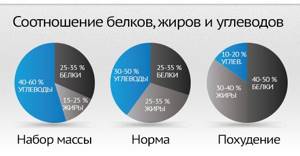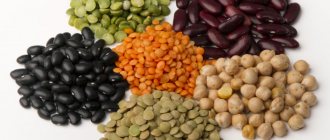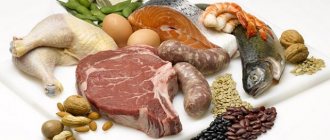A healthy diet requires a harmonious balance of proteins, fats and carbohydrates.
It's not just counting calories. For the normal functioning of each cell of the body, macro- and microelements are needed in the required quantities.
There are average values of BJU, but each organism is individual and the goals are different, you need to strive for your ideal.
This is important for both athletes and ordinary people, as it affects muscle growth, the effectiveness of diets and overall well-being.
Expert advice will help and teach you how to achieve your ideal.
What it is?
Macronutrients are substances that are vital for the body, all its systems and organs. These include:
- Proteins or proteins are substances involved in all processes occurring in the body. They act as “building material” for cells, tendons, and tissues. Proteins consist of enzymes responsible for the regulation of metabolism, hormones, antibodies, and hemoglobin. Protein deficiency is dangerous to health and can provoke the development of diseases of the circulatory system, liver, and gastrointestinal tract.
- Fats are part of cell membranes and perform an important protective function, protecting the body from the penetration of pathogenic bacteria and providing thermoregulation. With moderate consumption, fats will not lead to weight gain, and their deficiency, on the contrary, can cause the development of atherosclerosis and cardiovascular diseases.
- Carbohydrates are a fairly broad class, represented by a huge number of foods rich in vitamins, minerals, fiber and plant fibers.
Let's take a closer look at the role of each of the listed macronutrients for weight loss.
Why does the body need carbohydrates?
Carbohydrates are organic substances consisting of hydrogen, carbon and oxygen. A person is able to generate a source of energy on his own, but the main supply of strength comes from eating food.
Cereals contain 85% carbohydrates, sugar – 99%.
Carbohydrates are divided into 2 types:
- simple;
- complex;
The first type is found in sugar, honey, and sweets. Such substances are easily absorbed by the body and enter the bloodstream. Doctors recommend consuming these products in small quantities.

Complex carbohydrates include starch, fiber, dietary fiber, etc. They are absorbed more slowly. They are allowed to be consumed in sufficiently large quantities.
Functions of carbohydrates in the human body:
- provide energy;
- strengthen tissues;
- prevent the growth of bacteria in the stomach;
- break down fats;
- normalize the functioning of the immune system;
- participate in the formation of enzymes and the production of hormones.
Role in weight loss
The diet of a modern person is quite monotonous, and if a new interesting dish appears, it most likely turns out to be harmful and high in calories. This is due to a fast-paced lifestyle in which there is no time to cook or eat a full meal. From such an attitude, the body falls into real panic, mistaking it for danger signals, and begins to store everything for a rainy day with redoubled force. As a result, many systems malfunction, metabolism is disrupted, and symptoms of a lack of vitamins and nutrients appear.
Most people underestimate the importance of a balanced diet. In fact, such nutrition will allow you to lose weight without harm to your health and all its systems, as well as prevent the development of many diseases and pathologies. A proper menu should include the following basic products:
- vegetables;
- fruits;
- nuts;
- cereals and cereals;
- meat;
- fish;
- vegetable oils;
- products made from whole grain wholemeal flour - spaghetti, pasta, bread.
As a rule, short-term diets require the exclusion of most of the listed products - and this is wrong, since the body experiences stress from deprivation, to which it reacts quite aggressively: cardiovascular diseases, problems with the skin, and the gastrointestinal tract appear. Food should be affordable, tasty, healthy, be included in everyday life and be firmly established in it.
Squirrels
Protein plays a huge role in the process of losing weight, various online resources and printed sources talk about this everywhere. Numerous diets are based on it, for example the Dukan diet, which gained popularity at the end of the last century. Why is protein so useful? There are several reasons:
- Participates in the process of formation of cells from which the body is built: muscles, tendons, every organ - all this is protein.
- Improves blood quality and coagulability. The protein hemoglobin, for example, helps transport oxygen through blood vessels to organs.
- Responsible for the synthesis of hormones, regulates the functioning of the thyroid gland and adrenal glands. In addition, proteins are actively involved in the production of enzymes necessary to normalize the functioning of the gastrointestinal tract.
- Stimulates the functioning of the central nervous system: a lack of protein in the diet can cause decreased performance, increased fatigue, and loss of concentration.
- Helps improve liver and kidney function.
- Acts as a source of energy.
- Strengthens the immune system, fights infectious and viral diseases.
Protein can be of plant or animal origin. Both categories are equally important for the health of all systems, so it is important to include them in the daily diet.
Fats
Fat is another vital macronutrient for health and is a combination of glycerol and saturated fatty acids. They are involved in many processes occurring in the body and perform the following functions:
- Protect cells from external influences, penetration of pathogenic bacteria, and damage.
- Responsible for the elasticity of the skin.
- Participate in energy metabolism and provide thermoregulation.
- Help fat-soluble vitamins be fully absorbed. These include VITAMINS A, D, E, K.
- Normalize the production of hormones and enzymes.
Fats are divided into three large groups:
- Mono-saturated, represented by vegetable oils rich in oleic acid and omega-9 fatty acids, beneficial for the body;
- saturated, contained in large quantities in butter, lard, fatty meat, cream, sour cream, cheese, margarine, confectionery;
- poly-saturated, considered the most beneficial for health, as they help normalize blood pressure, cholesterol, and the cardiovascular system. Found in red fatty fish, nuts, avocados, and olives.
It is important to carefully monitor the amount of fat consumed, so that healthy, poly-saturated and mono-saturated types predominate in the diet.
Carbohydrates
Overweight people are usually convinced that carbohydrates are the main enemy for their figure. But you should understand that the main thing is their quantity. In moderate portions, they have a positive effect on the body:
- Helps cleanse the gastrointestinal tract. A large amount of carbohydrates are found in vegetables and fruits, which are also rich in fiber, plant fibers that are not digested by enzymes, but simply pass through the intestines, removing everything unnecessary.
- They are a good source of energy that nourishes cells and brain tissue.
- Increases immunity, protecting the body from the penetration of pathogenic bacteria.
- They participate in metabolic processes and help speed up or slow down certain reactions occurring in the body.
In order for carbohydrates to help the body and improve the functioning of all its systems, it is necessary to strictly monitor their consumption, count the amount and try not to overeat on them.
Factor 1: Fitness Goals
Your first step should be to clearly define your priority: burning fat or gaining muscle mass. You may ask, “What if I want both?” This is a case where it is better not to chase two birds with one stone at the same time. It’s better to choose one goal and put the second one aside for the future. You can gain muscle mass while working to lose weight, but you won’t see maximum efficiency. Why? A diet rich in carbohydrates enhances lean mass gain, while a low-carbohydrate diet is needed to accelerate fat burning.
Of course, there are techniques that allow you to go step by step to losing weight and gaining muscle mass at the same time. For example, carbohydrate alternation, in which high-carbohydrate periods for hypertrophy are replaced by low-carbohydrate periods that stimulate fat burning. Recent research also shows the effectiveness of short-term fasting in achieving two goals simultaneously. However, in both cases, individual results are mixed, and neither technique justifies neglecting the overall nutrient balance.
Regardless of which method you choose, you will gain more muscle mass and lose weight faster if you focus on one goal at a time. Many fitness professionals use the following scheme. The “mass” work continues for several weeks or months, after which the drying phase begins, allowing you to achieve a harmonious, slender physique. And as long as you stick to the standard guidelines for balancing protein, fat, and carbohydrates, you won't have to make major sacrifices to achieve your goals.

Note that the share of fat never falls below 15% of the total calorie intake. The body produces hormones from cholesterol and other lipids, and therefore further reduction in fat intake can lead to hormonal imbalances. It also negatively affects body functions regulated by these hormones, including growth, development, metabolism, reproduction and mood. Low fat intake can also impair the absorption of fat-soluble vitamins A, A, and K. Worst of all, a deficiency of essential fatty acids can increase the risk of colon, breast and prostate cancer.
But, as you understand, not all sources of fat are equally healthy. Prioritize healthy fats such as monounsaturated fats (avocado, egg yolk, olives, nuts, peanut butter, canola oil, olive oil, high oleic sunflower oil), medium chain triglycerides (coconut oil) and omegas -3 fatty acids (salmon and other fish, grass-fed meats, chia seeds, flax seeds, soybeans, bean curd, beans, wild rice and walnuts).
Percentage
Calculating the daily balance as a percentage is quite simple; on the Internet you can find online calculators that, within a couple of seconds, will accurately determine how much KBJU is needed for weight loss or weight gain for a girl or guy, an active man or a housewife. On average, the percentage is as follows:
- The amount of protein in the diet should be approximately 25-35% of the daily value, this value largely depends on the goal, age, level of physical activity, but on average it is 1-2 grams per kilogram of weight.
- Experts from the World Health Organization recommend consuming approximately 30% of your daily fat intake per day. Of these, about 10% should be mono-saturated, and the remaining should be poly-saturated. On average, an adult should consume 60-90 grams.
- The amount of carbohydrates consumed must be closely monitored, with preference given to healthy, slow-burning ones, which include fruits, vegetables, grains and cereals, berries, pasta made from durum wheat. The daily amount should be approximately 30-50% of the daily diet - 3.5-4.5 grams per kilogram of weight.
Proteins, fats and carbohydrates are just part of a huge mosaic
After you hear the phrase “abdominals are created in the kitchen” for the hundredth time, you will want to pay all your attention to the balance of nutrients and push into the background other factors that are no less important from the point of view of the overall result. Don't make these mistakes, otherwise you won't see the forest for the trees!

Achieving success depends on many factors and you must take them all into account
One of the key additional factors is the energy content of the diet. Even the ideal ratio of protein, fat, and carbohydrates won't help if you're getting too many or too few calories. Likewise, you will never build a powerful, muscular physique if you are not willing to take the training process seriously!
It may seem like too many factors to keep in mind, but don't despair. You're on your way to a healthy lifestyle, not solving math problems. Determining the ideal nutrition strategy for you will take time, and as your fitness goals evolve, so will your nutritional needs. But with persistence, determination and a willingness to change, you will continually progress in the right direction.
Daily calculation
Calculation of the daily norm of BZHU largely depends on individual characteristics: gender, age, height and weight. A man and a woman, with the same other indicators, need different amounts of kcal, grams of proteins, fats, carbohydrates daily.
First, you need to understand a few basic concepts necessary for the calculation:
- basic metabolism - the number of calories needed by the body to maintain vital functions: body temperature, ensuring the functioning of all systems and organs;
- Daily requirement is the number of calories the body needs to maintain its current weight. This is the basic metabolism and the amount of energy spent on everyday tasks and physical activity;
- Calorie deficit or norm for weight loss is the number of calories the body needs to gradually lose weight without harm to health. This is the value of the basic metabolism and the amount of energy spent on training and daily activities, from which 10-15% must be subtracted;
- surplus or caloric norm required for weight gain - the number of calories the body needs to gradually gain weight without harm to health. This is the value of basic metabolism and the amount of energy spent on training and daily activities, to which you need to add 10-15%.
Knowing this, you can create your own diet and change it depending on your current needs.
Mifflin-San Geor calculation formula
In 1990, an American nutritionist at Mifflin-St. George published data from a study he conducted with his team of highly qualified specialists. It displayed a new formula for determining the body’s daily calorie needs, it looked like this:
- For women: (10 × weight, kilograms) + (6.25 × height, centimeters) − (5 × age, years) - 161.
- For men: (10 × weight, kilograms) + (6.25 × height, centimeters) − (5 × age, years) + 5.
Like the Harris-Benedict formula described below, it takes into account a person's height, weight and age, as well as their gender. The resulting value must also be multiplied by the activity coefficient:
- 1.2 - low physical activity, sedentary lifestyle;
- 1.38 - moderate physical activity, 1-2 workouts weekly;
- 1.6 - average level of physical activity, at least three intense workouts every week;
- 1.73 – high level of physical activity, about five intense workouts weekly;
- 1.9 - intensive training daily, combined with hard physical work.
Harris-Benedict formula
Back in 1919, the American physiologist Francis Gano Benedict, together with the botanist James Arthur Harris, developed the concepts of basic metabolism and derived the first formulas for calculating the average daily norm, which looked like:
- For women: 55.0955 + (9.5634 × weight, kilograms) + (1.8496 × height, centimeters) − (4.6756 x age, years).
- For men: 66.4730 + (13.7516 × weight, kilograms) + (5.0033 × height, centimeters) − (6.7550 × age, years).
The resulting value must be multiplied by the corresponding activity coefficient described above - you will get the number of calories needed daily to maintain your current weight.
Calculation of BZHU
Let's consider an example calculation for a girl weighing 60 kg, height 168 centimeters, age 21 years old, leading a moderate lifestyle:
| Mifflin St. Geor Formula | Harris-Benedict formula | |
| Determination of basal metabolic rate | (10 × 60) + (6.25 × 168) − (5 × 21) − 161 = 1384 kcal | 655.0955 + (9.5634 × 60) + (1.8496 × 168) − (4.6756 × 21) = 1442 kcal |
| Multiplication by the activity coefficient, for this case it is equal to 1.38 | 1384 × 1.38 = 1910 kcal | 1442 × 1.38 = 1990 kcal |
| Norm for weight loss | 1910 kcal − 15% = 1624 kcal | 1990 kcal − 15% = 1692 kcal |
| Protein norm | 35% of diet = (1624 × 0.35)/4 = 142 g | 35% of diet = (1692 × 0.35)/4 = 148 g |
| Fat norm | 15% of diet = (1624 × 0.15)/9 = 30 g | 15% of diet = (1692 × 0.15)/9 = 30 g |
| Carbohydrate norm | 50% of the diet = (1624 × 0.5)/4 = 203 g | 50% of diet = (1692×0.5)/4 = 212 g |
Tips for better results
The following simple recommendations will help improve the result of calculating KBJU:
- eat in small portions: often and in small portions, about 5-6 times a day;
- cook with a minimum amount of oil or without it at all, using a grill, double boiler, or non-stick frying pan;
- reduce the consumption of salt, sugar and foods rich in them: smoked meats, confectionery and flour products, canned food, semi-finished products;
- try to look for an alternative to “harmful” dishes, cook on your own, if possible avoid food from the supermarket, since it may contain hidden sugar, various additives, preservatives that are harmful to health;
- Drink a sufficient amount of clean drinking water per day - at least 1.5-2 liters. The norm is 30 ml per kilogram of weight.
Proper nutrition is often not enough for weight loss; other factors are also important, which a weight loss clinic can explain in more detail. Which ones are they talking about, for example? Proper nutrition is just enough to lose weight. But for proper nutrition, it is not enough just to know what and how much to eat. Everyone knows, but few do it. It doesn’t work to force yourself for a long time, and after violence of any duration, the weight comes back. So you just need to get into the habit of eating right. And how to make healthy food a natural desire, a habitual and stress-free daily activity is taught by psychologists, psychotherapists, and weight loss specialists.
Expert opinion
The main and determining factor for losing weight is the psychology of eating behavior. A competent specialist supervises the patient throughout the entire weight loss process and helps him solve the following issues:
- goal setting, search for motivation tools;
- analysis of existing psychological problems: often people eat stress, eat for company or out of boredom - all this is wrong, each of these situations requires searching for a different “solution”;
- establishing relationships with loved ones, friends, colleagues: moral support is extremely important for losing weight;
- tasty food can be a kind of “reward” - for hard work, for a task successfully completed: food should be a way to satisfy the needs of the body, you should not make a cult out of it.
In fact, weight loss is a long process that has a large number of pitfalls and hidden difficulties. Only 5% of people are able to lose weight on their own, without any help. For everyone else, it’s better to immediately seek help from weight loss specialists, rather than test your body’s strength.










